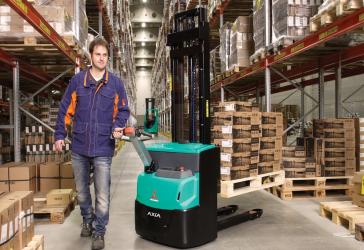
When the time comes for companies to replace their aging forklifts, they often look for a second-hand truck in good condition. While there’s every chance that the used truck may be perfectly fine, is it always the best choice for your application?
It’s often the case that the company hasn’t really thought about how the machine is actually being used day-to-day. Ideally, they’d look at how often it’s being used and in what situations. After all, the truck may have been in service for 5 or 10 years and businesses can change significantly in that time.
By looking at the situation with fresh eyes, they may well come to a completely different purchasing decision today. For example, in the past they might have replaced two forklifts with two like-for-like models. After evaluation those trucks could potentially be replaceable with an electric forklift (such as the EDiA EM which can cover the indoor and outdoor lifting), and a stacker to put merchandise away in pallet racking.
Of course, the question many of you will now be asking is: “Really? A pallet stacker? But how can that be a real alternative to a forklift truck?”
And while your doubt is understandable, and use of a pallet stacker does depend on the specific application, there are a few strong arguments that may help to make the case for stackers:
Is the stacker powerful enough?
Well, the majority of forklifts used fall into the in the 1.5–2.5-tonne range. This is particularly true in small distributions or warehouses where the majority of pallets weigh even less. A modern electric stacker combines good ergonomics (as operators no longer need to pull or push the tiller arm) with load capacities up to 2 tonnes.
Isn’t the stacker only for the first 2 levels?
In addition to pedestrian stackers, there are also models such as sit-on stackers with very high residual capacities. Sit-on or stand-on versions can effortlessly put a pallet away in most standard warehouses with 4 metres racking height. Models such as the Mitsubishi SBS15-20N are more than happy lifting goods up to 6.5m in narrow aisles.
Don’t you have to walk a lot with a stacker?
While it’s true the pedestrian stacker is not made to cover large distances, there are models a (foldable) platform available which have been designed for exactly that purpose.
Another big advantage of using a stacker: they provide excellent manoeuvrability in tight aisles. This allows you to place the racking closer to increase your warehouse capacity. Compact, robust and extremely versatile, stackers are an excellent, cost-effective choice for fast and safe pallet lifting.
So ask yourself: when you’re next in the market for a truck, what will you choose?
- Actions:
- Conduct a site survey to discover whether your materials handling equipment fleet needs adjustments.
- Contact your forklift dealer to discuss the options about the best mixed fleet options.
Source : https://forkliftbriefing.com/save-money/a-new-pallet-stacker-could-the-best-alternative-to-a-used-forklift/
